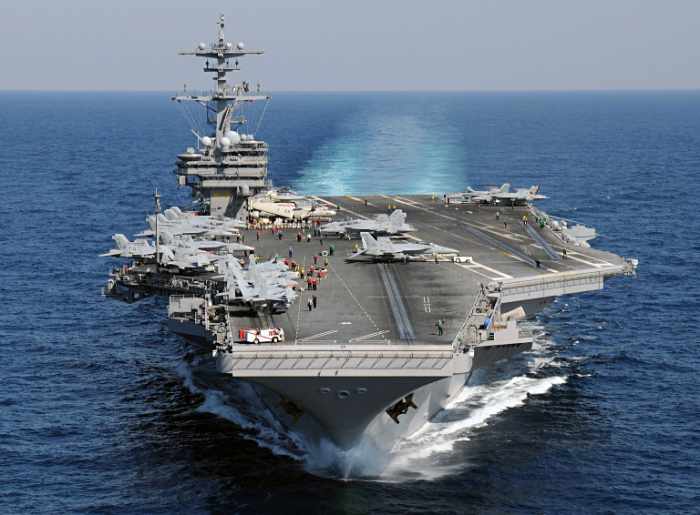Iraq asks US for air support to counter rebels

– World news selected by Gazette editors for Phuket’s international community
PHUKET: Iraq has asked the United States for air support in countering Sunni rebels, the top U.S. general said on Wednesday, after the militants seized major cities in a lightning advance that has routed the Shi’ite-led government’s army.
However, General Martin Dempsey, the chairman of the U.S. military’s Joint Chiefs of Staff, gave no direct reply when asked at a Congressional hearing whether Washington would agree to the request.
Baghdad said it wanted U.S. air strikes as the insurgents, led by fighters from the Islamic State of Iraq and the Levant (ISIL), battled their way into the biggest oil refinery in Iraq and the president of neighbouring Iran raised the prospect of intervening in a sectarian war that threatens to sweep across Middle East frontiers.
“We have a request from the Iraqi government for air power,” Dempsey told a Senate hearing in Washington. Asked whether the United States should honour that request, he answered indirectly, saying: “It is in our national security interest to counter ISIL wherever we find them.”
In the Saudi city of Jeddah, Iraqi Foreign Minister Hoshyar Zebari said Baghdad had asked for air strikes “to break the morale” of ISIL.
While Iraq’s ally, Shi’ite Muslim power Iran, had so far not intervened to help the Baghdad government, “everything is possible”, he told reporters after a meeting of Arab foreign ministers.
Sunni fighters were in control of three quarters of the territory of the Baiji refinery north of Baghdad, an official said there, after a morning of heavy fighting at gates defended by elite troops who have been under siege for a week.
ISIL aims to build a Sunni caliphate ruled on mediaeval precepts, but the rebels also include a broad spectrum of more moderate Sunnis furious at what they see as oppression by Baghdad.
Some international oil companies have pulled out foreign workers. The head of Iraq’s southern oil company, Dhiya Jaffar, said Exxon Mobil had conducted a major evacuation and BP had pulled out 20 percent of its staff. He criticised the moves, as the areas where oil is produced for export are mainly in the Shi’ite south and far from the fighting.
Washington and other Western capitals are trying to save Iraq as a united country by leaning hard on Shi’ite Prime Minister Nuri al-Maliki to reach out to Sunnis. Maliki met Sunni and Kurdish political opponents overnight, concluding with a frosty, carefully staged joint appearance at which an appeal for national unity was read out.
In a televised address on Wednesday Maliki appealed to tribes to renounce “those who are killers and criminals who represent foreign agendas”.
But so far Maliki’s government has relied almost entirely on his fellow Shi’ites for support, with officials denouncing Sunni political leaders as traitors. Shi’ite militia – many believed to be funded and backed by Iran – have mobilised to halt the Sunni advance, as Baghdad’s million-strong army, built by the United States at a cost of $25 billion, crumbles.
Like the civil war in Syria next door, the new fighting threatens to draw in regional neighbours, mustering along sectarian lines in what fighters on both sides depict as an existential struggle for survival based on a religious rift dating to the 7th century.
HOLY SHRINES
Iranian President Hassan Rouhani made the clearest declaration yet that the Middle East’s main Shi’ite power, which fought a war against Iraq that killed a million people in the 1980s, was prepared to intervene to protect Iraq’s great shrines of Shi’ite imams, visited by millions of pilgrims each year.
“Regarding the holy Shi’a shrines in Karbala, Najaf, Kadhimiya and Samarra, we announce to the killers and terrorists that the great Iranian nation will not hesitate to protect holy shrines,” Rouhani said in an address to a crowd on live TV.
He said many people had signed up to go to Iraq to fight, although he also said Iraqis of all sects were prepared to defend themselves: “Thanks be to God, I will tell the dear people of Iran that veterans and various forces – Sunnis, Shias and Kurds all over Iraq – are ready for sacrifice.”
Iraqi troops are holding off Sunni fighters outside Samarra north of Baghdad, site of one of the main Shi’ite shrines. The fighters have vowed to carry their offensive south to Najaf and Kerbala, seats of Shi’ite Islam since the Middle Ages.
Saudi Arabia, the region’s main Sunni power, said Iraq was hurtling towards civil war. Foreign Minister Prince Saud al-Faisal, in words clearly aimed at Iran and at Baghdad’s Shi’ite rulers, deplored the prospect of “foreign intervention” and said governments need to meet “legitimate demands of the people”.
Maliki’s government has accused Saudi Arabia of promoting “genocide” by backing Sunni militants. Riyadh supports Sunni fighters in Syria but denies aiding ISIL.
The United Arab Emirates, a Saudi ally, recalled its ambassador from Baghdad and criticised what it called the sectarian policies of the Iraqi government.
The Baiji refinery is the fighters’ immediate goal, the biggest source of fuel for domestic consumption in Iraq, which would give them a grip on energy supply in the north where the population has complained of fuel shortages.
The refinery was shut on Tuesday and foreign workers flown out by helicopter.
“The militants have managed to break into the refinery. Now they are in control of the production units, administration building and four watch towers. This is 75 percent of the refinery,” an official speaking from inside the refinery said.
The government denied the refinery had fallen. Counter-terrorism spokesman Sabah Nouri insisted forces were still in control and had killed 50 to 60 fighters and burned six or seven insurgent vehicles after being attacked from three directions.
Oil prices rose on news the refinery was partly in rebel hands.
FROSTY MEETING
Last week’s sudden advance by ISIL – a group that declares all Shi’ites to be heretics deserving death and has proudly distributed footage of its fighters gunning down prisoners lying prone in mass graves – is a test for U.S. President Barack Obama, who pulled U.S. troops out of Iraq in 2011.
Obama has ruled out sending back ground troops but is considering other military options to help defend Baghdad, and U.S. officials have even spoken of cooperating with Tehran against the mutual enemy.
But U.S. and other international officials insist Maliki must do more to address the widespread sense of political exclusion among Sunnis, the minority that ran Iraq until U.S. troops deposed dictator Saddam Hussein after the 2003 invasion.
U.S. Senate Majority Leader Harry Reid said he did not back sending U.S. troops into the conflict in Iraq, which he described as a “civil war”, before a meeting with Obama about the crisis.
Reid and three other congressional leaders – Senate Republican leader Mitch McConnell, House of Representatives Speaker John Boehner and House Democratic Leader Nancy Pelosi – are meeting Obama later on Wednesday.
Western countries fear an ISIL-controlled mini-state in Syria and Iraq could become a haven for militants who could then stage attacks around the globe.
British Prime Minister David Cameron told parliament he disagreed “with those people who think this is nothing to do with us and if they want to have some sort of extrem
— Phuket Gazette Editors
Latest Thailand News
Follow The Thaiger on Google News:


























